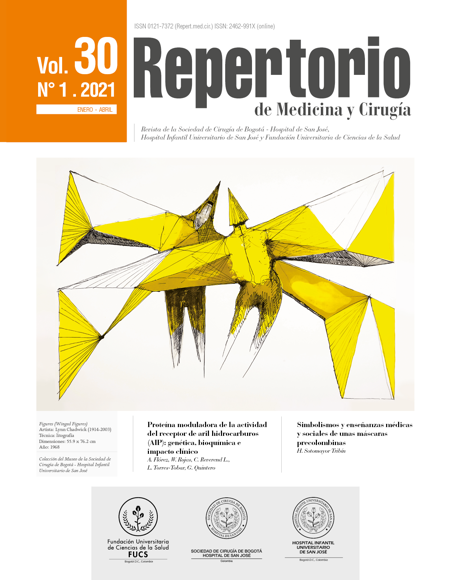Identificación de las capacidades tecnológicas de la Fundación Universitaria de Ciencias de la Salud, Colombia
Identification of tecnological capabilities of Fundación Universitaria de Ciencias de la Salud, Colombia
Esta obra está bajo una licencia internacional Creative Commons Atribución-NoComercial-CompartirIgual 4.0.
Mostrar biografía de los autores
Para innovar es necesario contar con capacidades. ¿Cuáles son las capacidades tecnológicas de la Fundación Universitaria de Ciencias de la Salud-FUCS de Colombia? Objetivo: identificarlas en el área de las ciencias médicas de la FUCS tomando en cuenta las siguientes dimensiones: capital humano, financiamiento en I+D+I, medición de la innovación, transferencia tecnológica, uso y apropiación de nuevas tecnologías, procesos de aprendizaje en la organización y productividad. Métodos y datos: investigación cualitativa en cuya primera fase se construyó un marco conceptual sobre capacidades tecnológicas de las universidades pues solo se encontraron referentes aplicados a la industria. En la segunda se aplicó una encuesta semiestructurada a actores clave para identificar aquellos productos y/o servicios de investigación o de otras áreas con potencial para comercializar y/o patentar. En una tercera fase se aplicó la metodología de trayectoria de vida (lifecourse) para profundizar en el ciclo de vida de los productos con el fin de identificar las dificultades para la toma de decisiones. Resultados: se logró establecer una línea para la vigilancia tecnológica en la organización, al contar con una base de datos de productos o servicios con potencial para comercializar y/o patentar que se gestan en la FUCS, a partir de una entrevista semiestructurada aplicada a actores clave. Otro de los hallazgos fue que uno de los principales retos es la construcción de una cultura organizacional orientada hacia la innovación continua y la normativa respecto a derechos de propiedad intelectual que definan las reglas de juego.
Visitas del artículo 816 | Visitas PDF 619
Descargas
- Rothaermel, F.T., Agung, S.D., Jiang, L. University entrepreneurship: A taxonomy of the literature. Industrial and corporate change. 2007;16(4):691-791. doi: 10.1093/icc/dtm023 DOI: https://doi.org/10.1093/icc/dtm023
- Siegel, D. S., Westhead, P., y Wright, M. Assessing the impact of university science parks on research productivity: exploratory firm-level evidence from the United Kingdom. International Journal of Industrial Organization. 2003; 21(9):1357-1369. DOI: https://doi.org/10.1016/S0167-7187(03)00086-9
- Markman, G.D., Phan, P.H., Balking, D.B., Gianiodis, P.T. Entrepreneurship and university-based technology transfer. Journal of Business Venturing. 2005(2);20:241–263. http://dx.doi.org/10.1016/j.jbusvent.2003.12.003 DOI: https://doi.org/10.1016/j.jbusvent.2003.12.003
- Katz, J. Cambios estructurales y ciclos de destrucción y creación de capacidades productivas y tecnológicas en América Latina. Globelics Working Paper Series. 2007-06,
- Katz JM. Reformas estructurales, productividad y conducta tecnológica en América Latina. Chile: CEPAL, Fondo de Cultura Económica; 2000. DOI: https://doi.org/10.18356/3f0ba0b0-es
- Katz JM. Desarrollo y crisis de la capacidad tecnológica latinoamericana: el caso de la industria metalmecánica. Programa BID/CEPAL/CIID/PNUD de Investigaciones sobre Desarrollo Científico y Tecnológico en América Latina. Buenos Aires, Argentina: Comisión Económica para América Latina y el Caribe; 1986.
- Cimoli, M. Creación de redes y sistema de innovación: México en un contexto global. El Mercado de Valores.2000;60(1):3-17.
- Parra Bernal LD, Argote Cusi ML, Zárate Torres R, Piñeros Muñoz AJ. Análisis de brechas tecnológicas en el sector metalmecánico desde el estudio de casos de contraste. Bogotá: Universidad EAN; 2016.
- Domínguez L, Brown F. Medición de las capacidades tecnológicas en la industria mexicana. Revista CEPAL. 2004;83:135-51. DOI: https://doi.org/10.18356/6cd9babf-es
- Bell, M. y Pavitt, K. Technological accumulation and industrial growth: contrasts between developed and developing countries. Industrial and Corporate Change. 1993;2(2):157-210. doi: 10.1093/icc/2.2.157 DOI: https://doi.org/10.1093/icc/2.2.157
- Porter ME, Stern S. National Innovative Capacity. In: Schwab K, Porter ME, Sachs JD, editors. The Global competitiveness report 2001–2002. New York: World Economic Forum; Oxford University Press, Inc 2002. p. 102-18.
- Richard R. N, Sidney G. W. An evolutionary theory of economic change. United States: President and Fellows of Harvard College; 1982.
- Romijn H, Albaladejo M. Determinants of innovation capability in small electronics and software firms in southeast England. Research Policy. 2002;31(7):1053-67. DOI: https://doi.org/10.1016/S0048-7333(01)00176-7
- Wang C-h, Lu I-y, Chen C-b. Evaluating firm technological innovation capability under uncertainty. Technovation. 2008;28(6):349-63. DOI: https://doi.org/10.1016/j.technovation.2007.10.007
- Turriago Hoyos A. Innovación y cambio tecnológico en la sociedad del conocimiento. 2 ed. Bogotá: Universidad de La Sabana; 2014. DOI: https://doi.org/10.2307/j.ctvn1tcmq
- Bell, M., Pavitt, K. Accumulating technological capability in developing countries. The World Bank Economic Review. 1992;6(suppl1):257-281. doi: 10.1093/wber/6.suppl_1.257 DOI: https://doi.org/10.1093/wber/6.suppl_1.257
- Aguirre Ramírez JJ. Metodología para medir y evaluar las capacidades tecnológicas de innovación aplicando sistemas de lógica difusa caso fábricas de software [Tesis]. Meddellín: Universidad Nacional de Colombia; 2010.
- Rousseva R. Identifying technological capabilities with different degrees of coherence: The challenge to achieve high technological sophistication in latecomer software companies (based on the Bulgarian case). Technological Forecasting and Social Change. 2008;75(7):1007-31. doi: 10.1016/j.techfore.2007.10.003 DOI: https://doi.org/10.1016/j.techfore.2007.10.003
- Trajtenberg M, Henderson R, Jaffe A. University Versus Corporate Patents: A Window On The Basicness Of Invention. Economics of Innovation and New Technology. 1997;5(1):19-50. doi: 10.1080/10438599700000006 DOI: https://doi.org/10.1080/10438599700000006
- Barro S., (coord). La transferencia de I+D, la innovación y el emprendimiento en las universidades Educación superior en Iberoamérica Informe 2015. Chile: Centro Interuniversitario de Desarrollo (CINDA); 2015. p. 541.
- Ranga M, Temel S, Ar IM, Yesilay RB, Sukan FV. Building Technology Transfer Capacity in Turkish Universities: a critical analysis. European Journal of Education. 2016;51(1):90-106. doi: 10.1111/ejed.12164 DOI: https://doi.org/10.1111/ejed.12164
- Parra Bernal L.D. y Argote Cusi M.L. Data Analytics to Characterize University-Based Companies for Decision Making in business Development programs. In: Eduardo Rodriguez editors. Data Analytics Applications in Latin America and Emerging Economies. New York: Taylor And Francis Group, 2017. p. 187-206. DOI: https://doi.org/10.4324/9781315164113-10
- Argote Cusi M, Parra LD. Marco Conceptual para el Análisis de Brechas tecnológicas en el sector metalmecánico. Análisis de brechas tecnológicas en el sector metalmecánico desde el estudio de casos de contraste. Bogotá: Publicaciones EAN; 2016. p. 7-21.
- Argote Cusi ML, Parra Bernal LD. Programa de fortalecimiento de capacidades en DATA ANALYTICS en empresas colombianas. Bogotá; 2018. p. 21.
- Prada-Ospina R. Corporate Entrepreneurship in Colombia: Contrast Cases of Two Colombian Manufacturing SMEs. In: Pérez-Uribe R, Salcedo-Pérez CS, Ocampo-Guzmán D, editors. Handbook of Research on Intrapreneurship and Organizational Sustainability in SMEs. Bogotá: IGI Global; 2018. p. 317-41.













